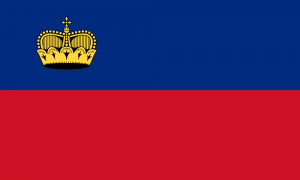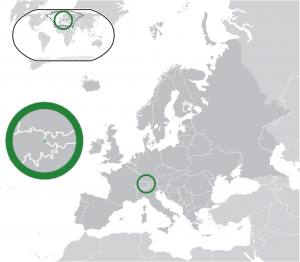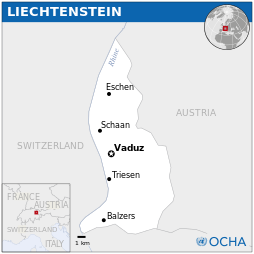General Business Information

The Principality of Liechtenstein is a tiny, landlocked country tucked away between Switzerland and Austria and with mountain slopes rising above the Rhine valley. It owes much of its wealth to its traditional status as a low tax haven, though the country has in recent years taken steps to shake off its image as a tax haven and to reposition itself as a legitimate financial center. [Source: BBC News]
Despite its small size and limited natural resources, Liechtenstein has developed into a prosperous, highly industrialized, free-enterprise economy with a vital financial service sector and likely the second highest per capita income in the world. The Liechtenstein economy is widely diversified with a large number of small businesses. Low business taxes – the maximum tax rate is 20% – and easy incorporation rules have induced many holding companies to establish nominal offices in Liechtenstein providing 30% of state revenues. The country participates in a customs union with Switzerland and uses the Swiss franc as its national currency. It imports more than 90% of its energy requirements. Liechtenstein has been a member of the European Economic Area (an organization serving as a bridge between the European Free Trade Association (EFTA) and the EU) since May 1995. The government is working to harmonize its economic policies with those of an integrated Europe. Since 2008, Liechtenstein has faced renewed international pressure – particularly from Germany – to improve transparency in its banking and tax systems. In December 2008, Liechtenstein signed a Tax Information Exchange Agreement with the US. Upon Liechtenstein’s conclusion of 12 bilateral information-sharing agreements, the OECD in October 2009 removed the principality from its “grey list” of countries that had yet to implement the organization’s Model Tax Convention. By the end of 2010, Liechtenstein had signed 25 Tax Information Exchange Agreements or Double Tax Agreements. In 2011 Liechtenstein joined the Schengen area, which allows passport-free travel across 26 European countries. [Source: The World Factbook]

Liechtenstein has a constitutional monarch as Head of State, and an elected parliament which enacts law. It is also a direct democracy, where voters can propose and enact constitutional amendments and legislation independent of the legislature. The Constitution of Liechtenstein was adopted in March 2003, replacing the previous 1921 constitution which had established Liechtenstein as a constitutional monarchy headed by the reigning prince of the Princely House of Liechtenstein. A parliamentary system had been established, although the reigning Prince retained substantial political authority.
Liechtenstein is a large producer of ceramics and is the world’s largest producer of sausage casings[citation needed] and false teeth.[32] Other industries include electronics, textiles, precision instruments, metal manufacturing, power tools, anchor bolts, calculators, pharmaceuticals, and food products. Its most recognizable international company and largest employer is Hilti, a manufacturer of direct fastening systems and other high-end power tools [Source: Wikipedia]
Fast Facts
|
Capital |
Vaduz |
|
Time zone |
CET (UTC+1) |
|
Area |
61 sq.mi. (160 sq. km.) |
|
Population |
37,313 |
|
Climate |
Mild Alpine |
|
Official Languages |
German |
|
Currency |
Swiss franc |
|
Government |
Unitary parliamentary constitutional principality |
|
GDP per capita |
$134,617 (Ranked 2nd best by the World Bank) |
|
Labor force |
35,250 |
|
Unemployment rate |
2.5% |
|
Weights and measures |
Metric |
|
International dialing code |
+423 |
|
Internet domain suffix |
.li |
|
Quality of life |
Extremely stable |
|
Doing Business rating |
N/A |
[Source: World Bank, World Factbook]
Establishing a Business

Liechtenstein corporate bodies are formed under the Law on Persons and Companies 1926, known as the PGR Code. Trust Enterprises are formed under the Law Concerning the Trust Enterprise 1928. A wide variety of types of entity can be formed under the PGR Code, the most commonly used of which are described below; other possible forms include the limited partnership with a share capital, the company limited by quota shares, the association, the co-operative association and the company without juridical personality; but they are not commonly met with in offshore situations.
All corporate forms that are allowed under the Code, and the Trust Enterprise, can additionally be either ‘holding’ companies (companies that hold investments) or ‘domiciliary’ companies (not having trading activities inside Liechtenstein). Holding, domiciliary and non-resident entities are sometimes known as ‘exempt’, i.e. exempt from certain types of taxation.
No permits or licenses are required to do business, except for financial sector companies and professional services. It is a notable feature of the Liechtenstein PGR Code that there is very great freedom, within the basic forms it describes, to constitute corporate and share structures in a flexible way according to the particular purpose of the entity and its originators’ wishes. Therefore only rather general statements can be made about the rules governing the operation of the various forms; the rest will depend on circumstances.
Corporate bodies formed under the PGR Code (not Trusts) share a number of characteristics:
• There must be written Articles of Association; they are deposited with the Registrar and are available on the public file, including details of capitalization, share structure, registered office, etc.
• The corporate body does not come into existence until its details have been entered into the public register
• The names of the directors, officers and shareholders are kept at the registered office
• The corporate name can be in any language and must include the name of the type of body concerned (Limited, Foundation, etc.), but some words are not permitted, mostly those with national or international territorial meanings (exemptions may be available)
Company Types
A Company Limited by Shares
The Company Limited by Shares is designed to be used as a public company, although it does not have to be public. There are founders who are (can be) distinct from the shareholders.
The Company Limited by Shares has a minimum capital of CHF 50,000, 20% of which must be paid up, with a minimum paid up of CHF 50,000. Bearer shares must be fully paid up, although the Articles can permit them to be 50% paid up; the minimum is still CHF 50,000.
If there is to be no public subscription, the company is formed ‘simultaneously’, in one legal act, and the founders are the shareholders. They create the company by entering into a Deed.
lf there is to be a public subscription, the company is formed successively:
1. The founders declare their intentions in general
2. The subscription process takes places
3. The final details of the company’s constitution are ratified in a general meeting of subscribers (shareholders)
Shares can have variable voting rights (e.g. multiple votes, or restricted votes), but nonvoting shares are not permitted. The appointment of an auditor, and the annual submission of audited accounts to the Registrar, are mandatory for the Company Limited by Shares.
A Limited Liability Company
The Limited Liability Company (Aktiengesellschaft) is formed by two or more members and has a minimum capital of CHF 30,000. The minimum subscription amount from any one shareholder is CHF 50. Further amounts need not be paid up unless the Articles provide for it; but the joint liability of the shareholders on liquidation or withdrawal is the amount of the registered capital.
Various types of share can be issued, including preference, registered, voting, no-par-value and bearer shares; only registered shares can be issued at below par value.
1. Voting rights can be allocated or not freely to all types of shares, and voting rights can be limited according to defined circumstances or occasions
2. A minimum of one director is required, who may be corporate; secretaries are not required; an exempt company needs to have a local professional as an agent
3. Audited annual accounts have to be filed
An Establishment (Anstalt)
The Establishment, or Anstalt, is a corporate form that is peculiar to Liechtenstein. It has no members or shareholders. It is an autonomous fund with beneficiaries. It is often used as a holding company for patents or royalties, or for estate assets. It has a founder or founders, who are not necessarily the same as the beneficiaries; the founders’ rights can be transferred, if the capital is not divided into shares, giving the current tenants of the founders’ rights considerable powers over the Establishment. In this respect, the Establishment is similar to the Foundation.
The minimum capital, if not divided into shares, is CHF 30,000; and if higher, at least half (minimum CHF 30,000) must be paid up
1. The minimum capital, if divided into shares, is CHF 50,000 (but this form is never nowadays used)
2. A minimum of one director is required; it is normal to delegate substantial powers of management to the director(s)
3. If the Establishment has commercial objects, audited annual accounts must be filed; but note that the management of investments or other assets is not deemed ‘commercial.’
A Foundation (Stiftung)
A foundation exists to give effect to the stated, non-commercial wishes of its founder, as set out in a foundation deed and the Articles of Association (Statutes). In effect, the assets with which the foundation is endowed become a separate legal entity. The Foundation has no members or shares; it is set up by a founder (or founders). Most often, this is the form that is used for the continuation of family assets. The Foundation has beneficiaries, who may be identified in a variety of ways.
1. No public registration is necessary, except that a copy of the Foundation Deed is lodged with the authorities. It need contain only very general statements about the purpose of the Foundation, while detailed rules are set out in private bye laws
2. Founder’s rights are transferable, and they normally include the right to terminate the Foundation or amend the bye laws
3. Commercial activities are not permitted except in so far as they are in pursuit of the Foundation’s non-commercial goals. The minimum assets of a Foundation are CHF 30,000, which can not be divided into shares; the assets do not necessarily have to pass to the Foundation on formation
4. A Foundation is normally administered by what amounts to a board of trustees
A Trust Enterprise
The Trust Enterprise is set up by a Trustor (settlor) through a Deed of Trust which is equivalent to Articles of Association, and must specify the name and purposes of the Enterprise, the identity of the trustees, the composition of the trust fund, and (if the purposes are commercial) the identity of the auditors. As usual, ‘commercial’ does not include asset management or holding operations. The Deed of Trust is filed with the Registrar of Trusts. The minimum trust fund is CHF 30,000. The participants in a Trust Enterprise are largely shielded from creditors of the Enterprise, who have access only to its own assets.
A Trust Enterprise can be created either without legal personality, and is then called an ‘active trust’ (eigentliche Geschaftstreuhand), or with legal personality, in which case it is called a ‘non-active trust’ (uneigentliche Treuunternehmen). Only non-active trusts have gained currency in Liechtenstein, and they are frequently used to hold investment assets, for instance in merger situations, and for the distribution of income from real estate holdings. The legal form of the Trust Enterprise is close to that of the American ‘Massachusetts Trust’.
One of the trustees must be a resident of Liechtenstein holding a recognized professional or other qualification. In the case of a non-commercial (i.e. unaudited) Trust Enterprise, this person certifies to the Registrar that the Trust has kept proper books and that no commercial activities have been carried out. This is the only reporting that is required.
Trusts
Liechtenstein is the only civil law jurisdiction which has adopted largely Anglo-Saxon trust legislation (contained in the PGR Code), although, unlike the common law trust, there is no bar against accumulation of income, nor against perpetuities.
A Liechtenstein Trust is set up by a written agreement (Trust Deed) between the trustor (settlor) and trustee(s) which does not have to contain the names of beneficiaries. If the Trust Deed is deposited with the Registrar of Trusts, it will not be publicly available, and later instruments (e.g. naming beneficiaries) will not have to be revealed; if the Trust Deed is not deposited within 12 months, details of the Trust must be placed on the public register. A registration fee of US$ 200 is payable on registration.
Some of the characteristics of Liechtenstein Trusts are as follows:
1. A trustee (apart from the Liechtenstein professional mentioned above) can be an individual or a corporation or association
2. Trustees are liable for breach of trust to the full extent of their assets; joint trustees are jointly liable; supervision of the trust is ultimately under the Court, even if the Trust Deed specifies alternative supervision
3. The interests of named beneficiaries can be embodied in trust certificates, which if registered are transferable securities
4. Being a civil law jurisdiction, trust assets are vulnerable to forced heirship provisions, although there are time limitations on such claims
5. In general, there is a limitation of one year on creditors’ claims
6. Trust documents, including the Trust Deed, can be in any language
Trusts may be set up under foreign law, but may not have more favorable treatment than would apply under Liechtenstein law. A trust under foreign law is a Liechtenstein Trust and subject to local taxation. Liechtenstein law applies to a foreign trust if the trustee, or more than half of the trustees, are resident in Liechtenstein, if the trust property is in Liechtenstein, or if the Trust Deed says so.
|
Designation |
Public limited company |
Establishment |
Foundation |
Registered Trust Enterprise |
Trust |
|
Capital: (bearer or registered shares) |
CHF 50,000 min |
CHF 30,000 min |
CHF 30,000 min |
CHF 30,000 min |
as desired |
|
Organization: |
· general meeting · board of directors · audit authority |
· meeting of holders of founder’s rights · board of directors · auditauthority, if app. |
· Founder · foundationboard · audit authority, if app. |
· meeting of holders of settlor’s rights · board of trustees · auditauthority |
trustees as |
|
Taxation: |
0.1% on capital |
0.1% on capital |
0.1% of net |
0.1% of net |
0.1% of net assets, |
|
Liability: |
Company assets |
Company assets |
Company assets |
Company assets |
Company assets |
|
Document provoking possession/ |
shares (security) |
deed of assignment (title deed) |
by-laws |
deed of assignment (title deed) |
deed of appointment |
|
Main usage: |
· international · production and trade · real estate business · patent & license business · holding functions |
· international · generalcommercial sector · commerce & services · patents · exploitation of licenses · real estate business · financingtransactions · consulting · participation |
· international · highest level of discretion with foundations · successionplanning · patents · exploitation of licenses · capitalinvestment · assetmanagement · holding of participations |
· patents · exploitation of licenses · financingtransactions · participations · capitalinvestment |
· discretedisposal · successplanning · patents · exploitationof licenses · capitalinvestment · assetmanagement |
[Source: About Liechtenstein]
American Corporate Services offers experience and expertise for astute investors who wish to establish offshore businesses. Whether an investor wishes to immigrate or simply to establish a business entity, our network of professionals has the ability to advise, assist, direct and enable clients to understand and navigate the process for Liechtenstein company formation.
Our services include everything you need for starting a new business in Liechtenstein. In addition to helping to establish a Liechtenstein business bank account, helping you set up your business to conform to Liechtenstein accounting standards and to comply with Liechtenstein taxes, we also offer boutique amenities such as Liechtenstein secretarial services. We can even help you to create a Liechtenstein virtual office that will appear to others as though you are actually in Liechtenstein, even though you may be just about anywhere else on the globe at the time. Our business is making your investment a success
